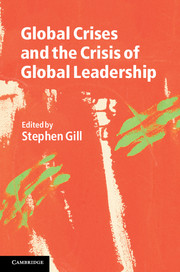Book contents
- Frontmatter
- Contents
- Contributors
- Acronyms
- Acknowledgements
- Introduction: global crises and the crisis of global leadership
- Part I Concepts of Global Leadership and Dominant Strategies
- Part II Changing Material Conditions of Existence and Global Leadership: Energy, Climate Change and Water
- 4 The crisis of petro-market civilization: the past as prologue?
- 5 Global climate change, human security and the future of democracy
- 6 The emerging global freshwater crisis and the privatization of global leadership
- Part III Global Leadership Ethics, Crises and Subaltern Forces
- Part IV Prospects for Alternative Forms of Global Leadership
- Glossary
- Bibliography
- Index
4 - The crisis of petro-market civilization: the past as prologue?
from Part II - Changing Material Conditions of Existence and Global Leadership: Energy, Climate Change and Water
Published online by Cambridge University Press: 05 June 2012
- Frontmatter
- Contents
- Contributors
- Acronyms
- Acknowledgements
- Introduction: global crises and the crisis of global leadership
- Part I Concepts of Global Leadership and Dominant Strategies
- Part II Changing Material Conditions of Existence and Global Leadership: Energy, Climate Change and Water
- 4 The crisis of petro-market civilization: the past as prologue?
- 5 Global climate change, human security and the future of democracy
- 6 The emerging global freshwater crisis and the privatization of global leadership
- Part III Global Leadership Ethics, Crises and Subaltern Forces
- Part IV Prospects for Alternative Forms of Global Leadership
- Glossary
- Bibliography
- Index
Summary
Summary
Current patterns of high-energy intensive development are not sustainable on account of two major challenges that threaten the social reproduction of this civilization: peak oil and global warming. This chapter seeks to probe the dimensions of this looming crisis at the heart of ‘petro-market civilization’ by foregrounding the links between energy and social reproduction. In doing so, the chapter makes two interrelated arguments. First, I argue not only that the age of fossil fuels is an exceptional one but also that the discovery and use of fossil fuels have been crucial to the deepening and extension of an incipient market civilization. Second, although there is recognition in both mainstream and more marginal circles that a broad-based global social transformation is needed in order to mitigate the probable consequences of global warming and peak oil, effective policy frameworks are not being put in place to deal with the looming crisis on the scale that would be necessary to transition to a post-fossil-fuel economy. The primary reason why this is so, I argue, is because solutions are informed by a neoliberal governmentality that prioritizes economic growth, international market mechanisms and individual responsibility.
Introduction
The collapse of global capitalization and the subsequent bankruptcy and loss of legitimacy of the financial institutions at the centre of the global political economy called for serious reflection on the failure of public and private leadership, the liberalization of financial markets and the need for more stringent regulation of global finance. Although it is well understood by some that financial crises are nothing new to an economic system based on commodity exchange and the accumulation of capital, the overarching policy debate of the moment appears to be focused on two rather short-term questions or concerns (Marx 1978 [1867]; Kindelberger 2005). First, there is the question of how best to avoid or contain future crises through some form of greater public oversight and regulation. Then, second, there is the question of how best to stimulate consumer spending and global economic growth. The problem with this narrow focus on the economic and financial crisis is that it misses the far broader and impending crisis of social reproduction at the heart of a fossil-fuel-dependent global market civilization – a crisis of social reproduction that continues to deepen and spread. The looming crisis on the horizon – which is likely to be a far more devastating one – derives from the fact that the current patterns of high-energy intensive development can no longer continue, as a result of two major challenges that threaten the social reproduction of this civilizational order: peak oil and global warming. Whereas the financial system was bailed out by the public purse of many governments, it is unlikely that a similar bailout will be able to rescue global society from the consequences of fossil-fuel-dependent growth. Rather, both challenges require long-term planning, coordination and investment, not simply a timely injection of funds.
- Type
- Chapter
- Information
- Global Crises and the Crisis of Global Leadership , pp. 73 - 88Publisher: Cambridge University PressPrint publication year: 2011
- 3
- Cited by

